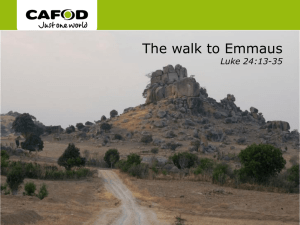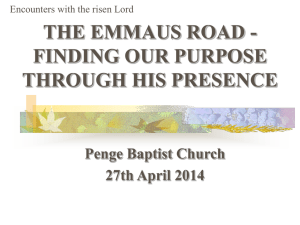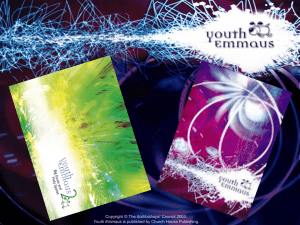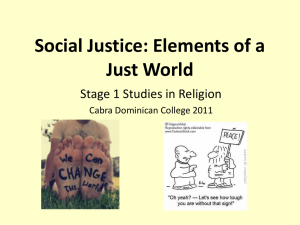EMMAUS INTERNATIONAL - Emmaüs International
advertisement
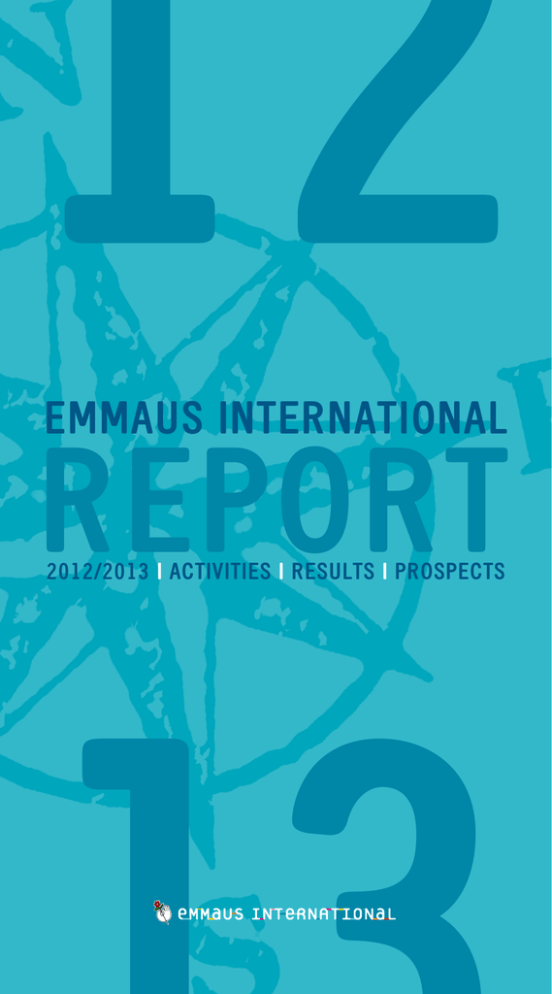
12 EMMAUS INTERNATIONAL report 2012/2013 ı ACTIVITIES ı RESULTS ı PROSPECTS e s r t of e m 0 30 Abbé Pie tern atio na ’s l’s ar Contents ch iv 37 countri es rre es 7 33 P2 – A word from the Chair P3 – Emmaus International – An overview lan guag g r o up s es and Emmaus In 6 4 90 €4 ity so lid are 5 i on t c a for 6 priority ar 3 21 3 1 8 9 € 8 as i r o f r e t n n io t a l a n ≥ Emmaus International on the move ≥ A patchwork of local activities ≥ Democratic governance ≥ Emmaus International, Abbé Pierre’s sole legatee ≥ The archives ≥ Abbé Pierre’s birthday centenary P11 – International solidarity – an essential network ≥ Helping each other: a mainstay of Emmaus International ≥ Solidarity sales and projects ≥ 2012 solidarity map ≥ Programmes to meet every need P17 – Developing access to basic rights ≥ Healthcare ≥ Migrants’ rights and freedom of movement ≥ Fighting people trafficking ≥ Water ≥ Ethical finance and a solidarity-based economy ≥ Education P24 – The Emmaus regions ≥ Africa ≥ America ≥ Asia ≥ Europe P27 – Financial report Emmaus International Annual Report, June 2012 – May 2013 1 A word from the Chair Emmaus is always a step ahead! A 2 nyone who has the opportunity of visiting Emmaus groups around the world will be truly taken aback by their vitality. Faced with the colossal task of fighting exclusion, amid extreme poverty and widespread indifference, our local organisations are brimming with inventiveness and resilience. They are demonstrating that poverty is not inevitable. As well as responding to emergencies and meeting the basic needs of some of the poorest people in society, Emmaus groups are also quietly building a fairer world, where everyone has a role to play, where money serves people, based on ethical and social values. Emmaus International is not afraid of drawing on the example Emmaus groups are setting in order to build, where possible, a more political presence. This is needed more than ever in a world that has been given over to competition and waste, in which basic rights are flouted. The spinelessness of policy-makers is further pushing us in this direction. Abbé Pierre, whose birthday centenary we marked in 2012, often used to sum up Emmaus by saying it was a “small, yet big thing”. He was, in this way, recognising the marginal impact and obvious weaknesses of Emmaus International’s action with regards to the immense challenges of fighting poverty. However, he also used to emphasise that a few individuals' determination to overcome their problems and refuse assistance, no matter how poor they were, could, through such a provocative impact, move mountains. Our founder had original insight, which is what we want to keep alive by continuing to take action and speak out. Jean Rousseau, Chair of Emmaus International EMMAuS INTERNATIONAL AN OVERVIEW 3 Emmaus International is made up of a host of people, organisations and countries, with an array of activities and commitments and united by the same principles of fighting the causes of poverty: when faced with unjust situations, take action and speak out. Let’s take a closer look... Emmaus International on the move Emmaus International has almost as many activities as it does groups. Only the membership dues – worked out according to each group’s resources – and an annual sale enable priority action and international solidarity to be implemented. Shared commitments Companions, volunteers and staff in their thousands are investing their time and energy every day to support the causes defended by every Emmaus group in the world. They are joined through shared, strong commitments that constitute Emmaus International’s identity: offering unconditional shelter, respecting human dignity, recognising every individual’s ability to take control of their lives and to manage on their own and showing solidarity with the most vulnerable people in society. Income-generating activities at io n a n d t r ai nin Outreach, action for prisoners and addicts, tackling indebtedness, legal aid, work integration, medical, social and psychological support…. rt School, learning support, literacy, dress-making, computing, building, metalwork, car mechanics, handicraft, agriculture, driving lessons, culture… g ne Aware Basic rights, violence against women, HIV and Aids, health education, environmental issues… Food bank, accommodation, microcredit, interest-free loans, low cost shops and services, new technologies… uc EMMAuS INTERNATIONAL – an overview s ising Ed Decisions that guide international action are made by the Emmaus groups. This democratic way of operating gives legitimacy and strength to the action, as it is supported by those who, in the four corners of the world, have instigated it. All of the bodies, both governing and consultative, are group members who have wanted to get more involved and take part in international action and reflection. Through this form of organisation, Emmaus International remains faithful to its principles and its members. a s -r and financia al i l r aid On the ground Ma te Social activities po Each member organisation has its own legal identity and organisational, political and religious independence. To ensure organisations function smoothly, there are certain requirements to becoming a member of Emmaus International. Organisations must operate in a democratic manner, their finances must be transparent and they must be financially independent, or at least be aiming to be so. Collecting, sorting, restoring used items and materials, re-use, second-hand shops Shops, microcredit, cybercafés, letter writers, local radio, agricul oduction tu r car mechanics, flourmill, P r waste collection, Carpentry, Organic and gardening, construction, non-organic farming, removals… metalwork, soap-making, market gardening, dress-making, weaving, fish-farming, livestock printing, baking, farming, beekeeping, cheese-making, dairy… handicraft… e Autonomous groups -h co nd a n d g o se s Collect ing services od 4 Emmaus International is a secular movement, which has been working for solidarity and fighting social exclusion and poverty since it was founded by Abbé Pierre in 1971. Its founding principles are take action and speak out and serve first those who suffer most. In practical terms, it enables some of the most disadvantaged people to take back control of their own lives by helping others. Their activities may be diverse but work, solidarity and including socially excluded people in developing and implementing solutions, from which they themselves benefit, are key to what the 337 Emmaus International groups do. In the 37 countries and four continents on which Emmaus International is working, its member organisations develop economic and solidarity-based activities with some of the poorest people in society. They tackle waste by collecting and recycling second-hand goods, making handicrafts, doing organic farming, helping street children and providing microcredit. A patchwork of local activities s S o cial up 2012/2013 ANNUAL REPORT 5 Democratic governance Elected members The Board The Executive Committee Jean Rousseau Chair Simon Grainge Moon Sharma Jean Karekezi 1st Vice-Chair United Kingdom 2nd Vice-Chair India Secretary France Tânia Schubert Barbosa Gérard Racinne Javier Pradini Jean Busogi Treasurer France Member Spain Member DRC Deputy Secretary Brazil 6 The way Emmaus International is organised was thought out from the very start when it was set up in 1971: it is democratic in that all member groups have an equal say. Every four years, a general (or world) assembly brings together all the Emmaus groups to elect a chair and to vote on the four-year report and guidelines for the future. Every year, there is a Board meeting, comprising the chair and several elected members from the four Emmaus regions worldwide – also known as councillors – to implement the guidelines and decisions voted upon at the general assembly. The Executive Committee meets every eight weeks, comprises a chair and seven councillors elected by the Board and representatives of the four Emmaus regions. The EC is responsible for the dayto-day management of Emmaus International. Each member is allocated a specific work domain, so they can monitor and make decisions about the work carried out by the international secretariat. The Emmaus regional secretariats support the Emmaus organisations in each region of the world, and supplement the international secretariat’s action on priority action, international solidarity and mobilisation. Two to three staff work at each secretariat alongside elected members in the region where they are based: Emmaus America, Uruguay; Emmaus Africa, Burkina Faso; Emmaus Asia, India; Emmaus Europe, France. THE INTERNATIONAL SECRETARIAT is composed of 16 staff members working in several departments: administration and organisation, mobilisation, coordination and training, solidarity, priority action, communications, life of the movement and finance. A Chief Executive is responsible for the secretariat and the secretariat reports to the Executive Committee. EMMAuS INTERNATIONAL – an overview François d’Assise Tokpo Mahamady Sawadogo Benin Burkina Faso Alexander Sawarimuthu Nantegue Kone Dženana Šabic Côte d’Ivoire Bosnia Oswald Quintal Hélène Sayad India Lebanon Franck-Benoît Puntous India Alberto Luis de Urquiza Argentina 7 Margherita Zilliacus Finland Silvana Nogarole Italy France Juan Melquiades Jorge Ambiado Hans Van Beek Tobias Petersson Gianni Belleti Peru Uruguay France Sweden Italy Composition on 1 June 2013 2012/2013 ANNUAL REPORT Emmaus International, Abbé Pierre’s sole legatee In his will, Abbé Pierre appointed Emmaus International as his sole legatee. This responsibility to “promote Abbé Pierre's ideas and work and protect his memory, as his sole legatee” is included in our statutes and has given rise to several new missions: Emmaus International has inherited Abbé Pierre’s personal archives. It is responsible for conserving them for their historic importance and for the wider public and Emmaus movement, and to promote them so this universal heritage is not forgotten. Abbé Pierre's estate, mainly compri sing copyrights on his various works – literary, photographic, audio, cinematic and audiovisual – and, in some cases, for their translations into several languages. ≥ ≥ 8 EMMAuS INTERNATIONAL – an overview ≥ Emmaus International is responsible for all aspects of Abbé Pierre’s image rights, particularly usage of his name to ensure it is not deformed or misused. Protecing Abbé Pierre’s memory from all forms of abuse or defamation. This is particularly hard to achieve at global level since Abbé Pierre has become such a well-known figure in the fight against poverty and injustice. ≥ As Abbé Pierre’s sole legatee and having been entrusted with taking up his action around the world, Emmaus International takes care of its founder’s heritage and image and is responsible for keeping his memory alive. Cataloguing the past… In late December 2000, Abbé Pierre and Emmaus International deposited 200 metres worth of archives (documents, photo libraries, posters and audiovisual material) at the National World of Work Archives (ANMT) in Roubaix, France. Since 2001, three archivists have worked on the archives. It has taken four years to catalogue the paper archives and make a preliminary inventory of the audiovisual material and half of Abbé Pierre and Emmaus International's photo library. It will take another four years for all the cataloguing to be complete. The archives, which are numerous and largely littleknown, are truly precious. They are full of perspectives on Abbé Pierre’s life, speeches and action around the world, as well as Emmaus International’s work. Digitalising them in order to preserve them and make them more accessible is, however, a real challenge. Besides the large amount of funding that needs to be found, the task will take several years, even if the older audiovisual material needs to be saved as a matter of urgency. To date, only a fraction of the documents, photographs and audiovisual material has been digitalised. 9 …and promoting it The work that has been done is, however, already starting to pay off. There is now considerably more material available, which may be used for exhibitions and documentaries, consulted for proofreading manuscripts or to supplement new publications about Abbé Pierre and Emmaus. Once digitalised, these archives become a useful source of information, which is gradually being drawn upon to promote Abbé Pierre’s heritage. At the end of 2012, the French Ministry of Culture put forward a proposal for Abbé Pierre and Emmaus International’s archives to be entered in the UNESCO ‘Memory of the World’ register. The register compiles all kinds of documentary heritage that is selected for its international interest and exceptional value to all. This would provide fantastic recognition of Abbé Pierre’s unique international commitment. Emmaus International will undertake a thorough investigation of the archives between 2013 and 2015 for this purpose. 2012/2013 ANNUAL REPORT Abbé Pierre’s birthday centenary This year has featured an exceptional event: the centenary of Abbé Pierre’s birth on 4 August 2012. A variety of events were put on to commemorate the birth­ day centenary, to represent, promote and make known Abbé Pierre’s vision and action. Earlier in the year on 22 January 2012, Emmaus groups also marked five years since Abbé Pierre’s death, notably with the opening of the Abbé Pierre - Emmaus Centre (APEC) in Esteville, France. 10 * www.centre-abbe-pierre-emmaus.org/ Publications Nine publications about Abbé Pierre have been published during the year, including five books and children’s comic books. Four others have also been republished. In May 2012, a coffee table book was brought out entitled, Abbé Pierre, Inédits. Textes de combat, écrits intimes, correspondances (published by Bayard). It draws on some of Abbé Pierre’s recently catalogued archives that had previously been unpublished. Two other works, L’abbé Pierre, Mes amis, au secours ! (published by Découvertes Gallimard) and the biography, L’abbé Pierre, un homme libre (published by Le Dauphiné libéré, as part of its ‘Les Patrimoines’ collection) have benefitted from plentiful illustrations selected from among Abbé Pierre and Emmaus International’s archives. Two translations have been brought out: Les combats de l’abbé Pierre by Denis Lefèvre (published by Le ChercheMidi), translated into Italian with the support of Emmaus Italy, and Emmaüs et l'abbé Pierre by Axelle Brodiez-Dolino EMMAuS INTERNATIONAL – an overview (published by Presses de SciencesPo) has been translated into English with the support of Emmaus UK. Exhibitions ‘Abbé Pierre, brother to the poor, activist for peace’: this title of a unique exhibition at the ANMT in Roubaix, France from December 2012 to April 2013, was in fact taken from the introduction to one of Abbé Pierre’s CVs. Another exhibition, ‘Abbé Pierre, the photographer’, also demonstrates a lesser-known and more personal side of the founder of Emmaus International. It was staged in five locations in 2012 and at the regional salon for Emmaus groups in NordPas-de-Calais in France in April 2013. Public recognition The Paris Mint, which issues France’s legal tender, commemorated the centenary – with permission from the euro zone authorities – by minting a 2 euro coin portraying Abbé Pierre. The coins are now circulating throughout the euro zone. A commemorative collector’s coin has also been minted. A catholic television programme also did a live broadcast on 5 August 2012 from the APEC, which was shown on French and Belgian channels. In addition, documentaries have been broadcast throughout the year. INTERNATIONAL SOLIDARITY: AN ESSENTIAL NETWORK 11 Without international solidarity, Emmaus International would cease to exist. Solidarity is key to our exchanges, it drives sharing, and forms part of our identities. Via the solidarity initiatives around the world, the poor are taking action, and helping each other in aid of people who are poorer than they are. This solidarity is a great source of wealth! rapport d’activité 2012 / 2013 Helping each other: a mainstay of Emmaus International A founding principle 12 Solidarity is a founding principle of Emmaus International – it was the reason behind its creation. Far from being charity, solidarity holds together this supportive network, in which Emmaus groups’ activities help the members, go towards supporting local solidarity and, through the international initiatives, enable groups to help other groups, who assist others in turn. This solidarity stems from the huge inequality that exists between the world’s regions and countries. The Emmaus International solidarity fund is a direct application of the principle of sharing wealth. Everyone shares a varying proportion of their resources to contribute to the movement’s activities. The most fortunate groups, generally in Europe, are conscious of how privileged they are compared with other groups, so they agree to contribute more to a shared fund. This method of pooling resources meets another main objective: self-sufficiency. Although it is difficult for everyone to achieve, it becomes possible via sharing. Solidarity day by day In their own different ways, Emmaus groups are putting this solidarity into practice. They generally implement local and international solidarity. They provide social support, work alongside other organisations and run projects or activities, indirectly creating more solidarity. Emmaus groups often show international solidarity by getting involved in Emmaus International’s priority action or solidarity initiatives. Inter-group partnerships are also formed through the various meetings that are organised. These twinnings give Emmaus groups an opportunity to forge ties with each other and organise closer solidarity exchanges. International solidarity, implemented by the groups and coordinated by the international secretariat, comes in a variety of forms in order to meet all possible situations. The proceeds of annual sales staged by Emmaus groups, depending on their abilities, and their voluntary contributions go into a shared solidarity fund. This is used to carry out new activities for social purposes or generate income, provide support in case of financial difficulty, ship containers and supply emergency support. INTERNATIONAL SOLIDARITY: AN ESSENTIAL NETWORK Solidarity projects and sales Annual solidarity sales: a source of international solidarity Collecting, selling or producing items is not only a means of livelihood for Emmaus groups, but for Emmaus International’s solidarity initiatives as well. In fact, these initiatives are financed solely with the solidarity funds generated by the annual sales held by Emmaus groups. Every spring, Emmaus groups all over the world organise special sales, which vary according to the size of the group. The proceeds then go to the solidarity fund. The sales themselves are often very enjoyable and get members, companions and volunteers involved. They can also provide an opportunity for campaigning. Over the last few years, some groups have even organised joint sales, pooling their objects, energy and commitment to the cause, resulting in events on a regional scale. In 2012, solidarity sales held by Emmaus groups raised a total of 490 465 euros. This amount financed all the Emmaus International solidarity initiatives during the year: it made the container programme possible, bolstered the regional funds and lent a helping hand to several groups affected by emergencies. Funding our activities Every year, Emmaus International finances a selection of local solidarity initiatives for which Emmaus groups need support. In 2012, 18 initiatives by Emmaus groups or regions were supported with part of the sales proceeds. These initiatives included: ≥ Providing support for collective regio- ≥ ≥ nal initiatives. In 2012, for example, this was the case for the Emmaus America groups, which needed funding for training. Launching income-generating ini tiatives. This year, for example, the funding enabled Luanda (Angola) to set up a tailoring and dressmaking training scheme and the ATEP group (Togo) to open a bakery. Meeting one-off expenses such as the purchase of a lorry or agricultural tools, or setting up a second-hand shop. Women are often the biggest victims of poverty and exclusion. Emmaus groups are committed to righting this wrong and this year, once again, some of the projects for which they provided funding were dedicated to making life better for women: the support given to poultry farming in Bakhita (Togo) is helping to raise women out of poverty in a rural area; the Sonagnon group (Benin) was able to grant micro-credit to more women; Femmes Rurales Sans Frontières (Rural Women Without Borders, Cameroon) boosted its technical agricultural capacities; and AFA (Benin) was able to fund the activities of the Dodji Bata women. 2012/2013 ANNUAL REPORT 13 Solidarity map 1 Emmaus Salon in Paris, France 14 2 Ecotourism, Asia One hundred and fifty five Emmaus groups came to the 13th salon in June 2012, attracting 27 000 visitors to the big sale on the theme of re-use, giving groups a chance to present their activities. The sale raised up to 627 386 euros in support of international solidarity. The proceeds went to Africa this year for specific projects that were presented to the public including microcredit and water-access initiatives in Benin, agricultural activities in Cameroon and Togo, vocational training in Angola and the purchase of a van in South Africa. 3 Emergency support, Brazil In September 2012, Emmaus group Teresina lost its premises and warehoused goods in a fire so sent a request to Emmaus International for emergency support. To carry out the repairs needed, 3000 euros from Emmaus America and 11 000 from the Executive Committee Emergency Fund was granted. This was used to rebuild the destroyed warehouse, to protect the goods and furniture and improve working conditions in the sorting area. INTERNATIONAL SOLIDARITY: AN ESSENTIAL NETWORK The seven Emmaus groups in Asia have been running ecotourism initiatives for the past four years. Both green and culturally interesting, they enable groups to let other Emmaus groups and the wider public know about them. They also raise local people’s awareness about environmental issues and increase the groups’ resources so they come within reach of financial independence. With 9954 euros received from the solidarity fund, the groups are renovating the buildings to improve visitors’ stays. 15 4 Carpentry, Burundi The Emmaus Montbéliard community has chosen to commit to international solidarity by making significant financial contributions. Besides many other initiatives, ALDP in Burundi has thus been able to purchase modern carpentry machinery and increase its income by making made-to-order furniture. It also organises free vocational training. In addition, the carpentry workshop is made available to local unemployed people in the northern districts of Bujumbura with a view to their socio-economic integration. 2012/2013 ANNUAL REPORT Programmes to meet every need The emergency fund 16 This fund is for Emmaus groups that have been affected by disasters such as natural catastrophes, as well as local people with whom they work. In 2012, Emmaus International granted three requests for emergency support. Two came from groups which had been affected by fires (the Emaus Teresina community in Brazil and VCDS in India). The third came from groups in South India (Florence Home Foundation, Kudumbam and VCDS) which had been affected by Cyclone Nilam. These groups were granted joint emergency funding and support to help them rebuild. The container programme Not all Emmaus groups have access to the same resources, so they share what they have by sending each other shipping containers filled with useful goods. Emmaus groups in Europe select educational, technical or medical equipment, or goods such as clothes or bicycles, accor- This year, Emmaus UK sent its first container following two training and information days at Emmaus Coventry in May 2012. In November, Pascal Rajerison, director of the Emmaus Vie group in Madagascar, visited several UK groups including Emmaus Coventry, Cambridge and Village Carlton. Discussion took place on the needs of the Madagascar group and the opportunities that receiving a container would provide. Several UK groups worked together to provide the goods to Emmaus Coventry and put funds together in order to send the container at the end of December. This container, which arrived in Madagascar in February 2013, has allowed the Emmaus Vie group to carry out important work at their offices and run a solidarity campaign for disabled people. INTERNATIONAL SOLIDARITY: AN ESSENTIAL NETWORK ding to the needs of the receiving group, and send them to an Emmaus group in Africa or Latin America which then uses the contents for its own initiatives or activities. This solidarity between groups is extremely important as the containers are sometimes a major source of income for the receiving groups, in addition to income from their own initiatives. The International Container Fund supports the programme, provides training for the participants, allows groups to communicate before a container is sent, and even helps groups to send a container. In 2012, for example, three Emmaus groups received financial support to help them meet the costs of sending a container and administrative support to help them with customs procedures. In 2012, 50 containers were sent, seven of which were sent to Emmaus groups in Latin America and 43 of which were sent to Emmaus groups in Africa. Despite the financial crisis which is still affecting many countries, the solidarity between groups showcased by this programme is the same year on year, and has even increased this year with new participants such as the UK Emmaus communities. IMPROVING ACCESS TO BASIC RIGHTS As part of its fight against the causes of poverty, Emmaus International is committed to defending fundamental human rights and, since 2003, has been working on priority action areas, voted for by the groups. In terms of action and campaigning, each of the six areas is rooted in activities in the field which show the groups' commitment to these causes and lend legitimacy to the political stance taken on international issues. The objective of these action areas is to show that there are alternative solutions, that these solutions can be applied anywhere in the world, and that even the poorest can be a driving force behind the decisions that affect their future. rapport d’activité 2012 / 2013 17 Healthcare 18 Context Poverty makes the poor vulnerable to health problems and increases the lack of equality in healthcare. For this reason, Emmaus International has chosen to make access to healthcare part of its priority action. It aims to make it possible for even the poorest to have access to health­care, and to establish community health­care systems. Mutual health schemes have, therefore, been implemented in Africa and Asia to allow local people to meet their healthcare costs, gain access to quality medical treatment and take part in the initiative as a community. Members make a monthly contribution and, in return, they are reimbursed part of their healthcare costs. The amount to be reimbursed is decided by the beneficiaries themselves and helps cover the costs of medicines, vaccinations, consultations and even hospitalisation. Progress In Africa, more than 1600 members from eight Emmaus groups in Benin and Burkina Faso now benefit from mutual health schemes. Local committees manage agreements with health centres, IMPROVING ACCESS TO BASIC RIGHTS Migrants' rights and freedom of movement creating health partnerships. Now, with ten years of experience in the field, Emmaus International is reforming the scheme and taking expert advice in order to make it even more successful. The reform is intended to make the scheme run even more smoothly and efficiently by making a number of changes, including creating national systems, replacing individual tariffs with family ones and improving management techniques. An assembly will be held in September 2013 to conclude the reform of the scheme. In Asia, two mutual health schemes, in India and in Bangladesh, were launched two years ago and almost 2000 people are now enjoying improved care at dedicated health centres and Emmaus health camps. Although it is still early days for these mutual health schemes, they are already seeking to improve their management and establish good practice in order to improve the service they offer. Progress has been slow but steady as the directors have been careful to respect the Emmaus International principle of financial independence, without ruling out the possibility of expanding the schemes in the future. On both continents, Emmaus International provides support for the schemes in the areas of quality, independence and maintaining high administrative and budgetary standards. In the field The mutual health schemes have made it possible for an entire region to improve its standard of living. For example, 423 families have already signed up to the Thanapara Swallows programme in Bangladesh, and the directors are working on gradually extending the scheme to other groups so it has enough members to be sustainable and financially independent. Context One of Emmaus International's basic principles is that people should be offered shelter unconditionally, no matter their nationality, background or religion. Every day, Emmaus groups witness the difficulties faced by migrants and how these difficulties lead to injustice and poverty. Therefore, it comes as no surprise that in 2003 the organisation decided to make migrants' rights and the defence of freedom of movement part of its priority action. Progress Emmaus International's objectives include influencing immigration policy, alleviating the hardship faced by migrants, fighting prejudice and increasing public awareness of migrants’ rights. With this in mind, it participates in international networks of organisations campaigning on migration issues, thereby lending legitimacy to and raising awareness of its policy on the issue. The ‘A Visa for the World’ campaign was an important first step, leading to debate and collective action. In 2013, a new organisation with a wider scope was launched: the Organisation for Universal Citizenship (OUC). The organisation comprises Emmaus International, the France Liberté-Danielle Mitterand Foundation and Utopia Movement, and aims to promote global freedom of movement and settlement. To achieve this, it has issued a Universal Citizenship Passport, the holders of which will be free to settle in any state that recognises the passport, without a visa and with the same rights as a citizen of that state. Furthermore, the OUC has requested that the United Nations commit to including a proposal for an international conference on freedom of move- ment and settlement on the agenda of its General Assembly. In April, the OUC and its objectives were presented at the World Social Forum in Tunis (Tunisia), and on 23 May, the organisation was officially launched at UNESCO House (Paris), where the first passports were issued to migrants and leading figures supporting the project. The next step is to publicise information on this new campaign so that groups, partners, sympathisers and states can get involved. Campaign website: www.o-c-u.org/ In the field Emmaus groups are particularly committed to this campaign as the issue of migrants' rights is one that they deal with every day. Approximately thirty debates were organised over the year to explain the objectives of the action area, increase awareness among Emmaus activists and the general public, provide the opportunity to act and establish a strong political stance. To give just one example of action taken by Emmaus groups, the Cernay group (France) is now working with a local collective to increase awareness of the campaign more effectively and owns accommodation which is specifically set aside for migrants. 2012/2013 ANNUAL REPORT 19 Fighting people trafficking Context For years, Emmaus has seen that the issues of migration and human trafficking are linked: three quarters of trafficking victims are from another country. This must be taken into account when tackling these important political and human rights issues, and responses to both must be complementary and cohesive. This is why, at our 2012 World Assembly, Emmaus groups chose to take action on "the fight against all forms of exploitation or human slavery and trafficking." 20 Progress Once new priority action has been approved by the Assembly, the first phase is to take an inventory of local initia- tives that are already tackling the issue. As these initiatives vary greatly depending on the region and the local context, taking an inventory will allow information to be compiled on the levels of expertise of the groups behind the initiatives so they can pool their experience. In the future, as part of the second phase of the initiative, it seems likely that a common action plan will be implemented by and for those affected with the support of voluntary Emmaus groups and Emmaus International. It will then be possible to propose a strong international political stance. For now, there are plans to establish a fund from which groups will be able to request financial support for their activities in the field. In the field In Europe, groups have reported that more and more young people (under the age of 18) and women are asking for help and protection. The current activities of Emmaus groups can be divided into three categories: raising awareness through campaigning; preventing problems by organising public debates and providing victims with assistance; and facilitating integration by providing migrants with social and psychological support and guidance. Some Emmaus Europe groups are also working together in focus groups to better coordinate the defence of migrants' rights and the rights of asylum seekers. IMPROVING ACCESS TO BASIC RIGHTS Water Context In the field Due to their international connections, Emmaus groups are aware of the daily difficulties many face when it comes to access to drinking water and sanitation. These difficulties lead in turn to others - sanitary, financial and agricultural problems; a loss of time - and build up to become sources of poverty, disease and even death. Therefore, in 2003, Emmaus International decided to implement priority action to highlight the lack of access to water in some parts of the world and show that change can come from the poorest through their collective action. The Nokoué project has shown that even the poorest can be at the heart of progress. It is an excellent example of an Emmaus International initiative as it showcases a community taking responsibility for the management of its own water. The success of the project will allow Emmaus groups to take the issue of access to water forward by campaigning and persuading local people and authorities that more can be done in their region, whether it is a matter of preserving natural resources, tackling pollution, resisting the privatisation of water, raising awareness or another challenge. Progress In 2006, Emmaus International launched a pilot scheme, the ‘Citizens Together in Solidarity for Water on Nokoué’ project. This project aimed to give the 70 000 people who live on or around Lake Nokoué in Benin sustainable access to safe drinking water as part of a community initiative. Together, Emmaus International, the local Emmaus groups and the local authority developed the project in such a way that the people of Nokoué will eventually be able to manage the project themselves, through a water users’ organisation. It is hoped that the facilities and good practice that have been established will prove to be sustainable and will lead to better health for all. After preliminary studies and two pilot building projects, work has now begun on seven other sites around the lake, where water conveyance structures, latrine blocks and a sewage treatment unit will be built by June 2014. In the meantime, Emmaus International and a partner organisation are continuing to run an extensive information campaign to raise awareness about hygiene among the local people. 21 Nokoué: an original and ambitious funding strategy Since 2003, Emmaus groups have been at the heart of the action, raising a large proportion of the project's funding. World Water Day on 22 March is, of course, when most events in support of the project are held, but Emmaus groups organise fund-raising events aimed at the general public such as themed sales throughout the year. In addition, some funding for the project and local people has come from outside Emmaus International. The European Commission's "EUACP Water Facility", part of the 10th European Development Fund; the Abbé Pierre Foundation; and the San Zeno Foundation, via Emmaus Italy, have all contributed to the funding of the project. And this year, in 2013, the Ile-de-France region will be joining them. 2012/2013 ANNUAL REPORT Ethical finance and a solidarity-based economy Education Context Context 22 For many years, Emmaus International has promoted alternative economic solutions and has witnessed the success of solidarity-based practices in terms of wealth creation. Due to this, and to the importance of preserving the organisation's political and financial independence, a focus on ethical finance has long been one of Emmaus International's key policies and is now part of its priority action. Indeed, faced with the deregulation of the market economy and financial industry, the consequences of which Emmaus groups have observed in terms of increased poverty and instability, supporting and promoting a financial system that better serves the interest of all has become an absolute necessity. It has never been more important for economic systems to be based on the principles of solidarity and social responsibility. Progress The ethical finance action area got off to a strong start with the establishment of the Emmaus Ethical Fund in partnership with an ethical Italian bank, the Banca Popolare Etica. Emmaus groups have the option to deposit money into the fund and the money raised acts as a financial reserve which is used to guarantee loans granted by the bank to Emmaus groups or other ethical organisations. These loans are then used to support socially useful economic activities. Currently, around one million euros have been deposited into the fund by approximately 50 groups from a wide range of countries. Emmaus International also raises awareness of ethical finance among its members, encourages them to transfer their assets to ethical banks and improves their practices. IMPROVING ACCESS TO BASIC RIGHTS In 2012, the decision was made at the World Assembly in Anglet (France) to expand ethical finance to include the concept of a "solidarity-based economy". This decision shows a strong political will to go further than the Emmaus Ethical Fund and focus on this issue more closely. Discussions to develop new financial practices are therefore in progress. Furthermore, other aspects of an economy based on solidarity and ethical finance are to be explored, with discussion on micro-credit and a focus on financial practices in particular. Finally, in spring 2013, Emmaus France and Emmaus Europe began work on a joint initiative to hold debates on the issue with French groups and to develop their solidarity-based economic practices. In the field Each Emmaus group puts this policy into action in its own way. Members of Emmaus Alençon (France), for example, decided to contribute to the Emmaus Ethical Fund as they appreciate its innovativeness and mutuality, and the fact that they could see the difference the project was making to those who received loans. This decision testifies to a strong sense of solidarity within Emmaus which will help support future projects, whether they are nearby or thousands of miles away, and whether they are run by Emmaus groups or other organisations which share the same values. Educational failure is an issue that almost all Emmaus groups have come up against as it is so often either the cause or the consequence of the poverty faced by the individuals they support. For Emmaus International, whose mission is to help the poorest find a way back into society, education is, therefore, an essential tool. The issue becomes even more important when we consider that in many countries Emmaus groups make up for the failings of the state by providing schools and training to people who otherwise wouldn't have access to education. This is why "Access to Education" is a priority action area, which has been implemented around the world since 2007. Progress A wide range of initiatives are in place, responding to the different problems that Emmaus groups face in each country, region and group of people. Therefore, the decision was made to develop an international programme that could be adapted to each context. An Emmaus International fund has been providing financial aid and support for training and education initiatives in Latin America, Asia and Africa for several years. In 2012, 40 000 euros went towards financing important educational projects which had both social and political aspects. This funding was used in two ways. First, it was used to provide classes, including both traditional subjects and more vocational training, for young people facing difficulties such as exclusion, poverty, isolation or disability. Second, Emmaus groups used it to give children the means to escape from poverty and to help them know their rights and participate fully in society. Although the details of each initiative depend on the country and the context, the educational initiatives organised by the groups are always built on these two foundations. The main concern now is to secure external funding in order to be able to provide greater support for the groups' projects and to consolidate the positions and practices upon which Emmaus International will be able to build a strong political stance and campaign. In the field The work carried out in the America region since 2000 has set a high standard for the international programme. During Emmaus regional councils, working groups on education select crosscontinent projects to be developed, with different groups working on different aspects of the project. Support is provided so that the projects and micro projects which are selected can become sustainable and financially independent educational programmes. 2012/2013 ANNUAL REPORT 23 THE EMMAUS REGIONS D Africa The Africa region comprises 15 groups in 9 countries. The activities in this region include social and economic initiatives and educational and sanitation programmes. In response to the interest that many local organisations have shown in Emmaus International, in 2013 elected members and the secretariat visited several groups that are either trial members or hoping to be. They also worked on improving communication and coordination within the region by organising meetings and debates with and between Emmaus groups. At international level, the region was behind a drive to increase participation in themed meetings and exchanges with groups from the other continents. As for the international solidarity initiatives, groups that received a container or funding for their projects benefited from ongoing support to ensure that the international support made as much impact as possible. Close attention was paid to the impact of the Nokoué project and the reform of the mutual health scheme, the first evaluation of which took place in July 2012 in Burkina Faso and the second in January 2013 in Benin in the presence of the regional elected members. 25 Emmaus International is active in four regions on four continents. Each region has its own secretariat and elected members, as well as exchanges between local groups, regional projects, administrative support and a system of solidarity which provides a firm foundation for the Emmaus cause. Here is an overview of the activity and progress in each region. D America The America region comprises 28 groups in 8 countries. Emmaus groups are involved in many different activities, but most of their income comes from selling second-hand clothes and from workshops: carpentry, metalwork, repair of household appliances, etc. The groups invest most of their energy and resources in education and training programmes. The highlights of the past year include several regional and international meetings, such as the Education Commission and the working group for the Urban Solid Waste Project. More generally, the region and its elected members have put into place many political and solidarity partnerships and an emergency support system. Last year, the region's elected members managed to visit all the Emmaus America groups (with the exception of the US groups who they plan to visit in 2013) in order to find out more about their initiatives. In addition, the region worked on improving its coordination with Emmaus International and the Emmaus groups in order to improve local relations, increase the frequency of exchanges and overcome language problems. Objective for next year: to increase each group's participation in international activities. 2012/2013 ANNUAL REPORT D Asia The Asia region comprises 7 groups in 4 countries. Of the many Emmaus initiatives in Asia, three stand out due to their local impact and their importance in terms of policy. First, Emmaus groups are working on providing access to water and finding ways to save it, both of which are essential in terms of the water table and sustainable agriculture. Second, Emmaus groups have responded to the appropriation of land by multinationals with a show of solidarity by supporting ethical finance, micro-credit projects and local financial institutions. Finally, an eco-tourism project is being developed as an alternative source of income in order to bring the region closer to self-sufficiency. This project will offer holidaymakers the opportunity to explore Asia ethically and responsibly. FINANCIAL REPORT In addition to all this, the elected members and the secretariat have provided ongoing support for the priority action on education, health and migrants' rights. The region has responded to three emergency situations, each of which required both attention and financial support in order for the Emmaus groups affected to be able to recover speedily. 26 27 D Europe The Europe region comprises 275 groups in 16 countries. In 2012, through the European Solidarity Programme, Emmaus groups helped four groups finance projects and activities. Although it is involved in a range of issues, such as ethical finance and environmental THE EMMAUS REGIONS sustainability, last year the region was particularly active with regards to the issue of human trafficking and the right to asylum, with a campaign managed by Emmaus groups and a meeting with European Union representatives. Summer camps for young volunteers were organised in eight different countries during the year. The high point of the year was the European meeting in Verona (Italy) in April 2013, in which 110 groups took part. With a focus on discussion and debate, this meeting provided an opportunity to broach both the subject of Emmaus Europe's economic, social and political role and the subject of sustainability in a period of negative growth. Small working groups debated the challenges the future will bring under the guidance of specialists on these subjects. The groups’ suggestions were discussed and evaluated. Emmaus International is financed solely by its member organisations’ membership dues and contributions. The solidarity projects are sometimes, however, supported by external partners. Below you will find information about income and expenditure, the balance sheet, budget forecasts, partnerships and Emmaus International’s activities in figures. 2012 in figures 2013 Forecast Income and expenditure 2013 budget (in euros) 2012 ended with a surplus of 306 849 euros, partly due to an increased amount of membership dues coming in and to a concerted effort to contain spending throughout the year. The 2013 budget is broken down into two parts: firstly, the Operating budget, which itemises financial data about the organisation’s day-to-day activities (membership dues, salaries and management costs, for example). Secondly the Priority Action and Solidarity budget details data about our initiatives around the world. 1 - Operations: € 292 512 surplus Reversals of provisions e 33 163 Misc. e 79 061 Abbé Pierre and Emmaus France contributions e 30 247 Support to decentralised organisations e 252 553 Income Expenditure € 1 890 341 € 1 599 829 Donations and legacies e 29 927 28 Staff for management tasks e 477 657 Life of the Movement e 120 551 Special contributions e 575 470 Sponsorship e 66 000 1 - Expenditure Provisions e 63 666 Reserves for depreciation e 10 737 Training e - Overheads e 58 574 World Assembly 445 533 e Membership dues e 1 078 473 Meeting costs e 154 105 Communications e 16 453 2 - Priority Action and Solidarity: € 14 336 surplus Subsidies and external income e 264 000 Membership dues e 556 472 Priority action e 898 133 General management of priority action e 1 173 810 2012 Emmaus Salons e 7 201 Allocated reserves e 1 179 596 Containers e 32 062 Income Expenditure € 3 484 775 € 3 470 439 Emmaus sales e 489 143 Non-allocated donations e 8 616 Targeted contributions e 986 948 Other commitments e 420 666 Regional solidarity projects/funds e 271 477 EC emergency fund e 23 093 Allocated reserves e 643 998 Balance sheet excerpt (in euros) 1 - Assets as at 31/12/2012 Gross DepreciationNet e 1 122 053 e 80 918 e 1 041 135 Total fixed assets Total current assets e 3 691 732 e 840 957 e 2 858 895 Unrealised exchange loss e 12 598 - e 12 598 Overall total e 4 826 383 e 921 874 e 3 912 628 2 - Liabilities as at 31/12/2012 Net Fundse 1 002 413 Risk and contingency provisions e 663 540 Dedicated funds e 643 998 Debts e 1 601 733 Unrealised exchange gain e 944 Overall total e 3 912 628 31/12/2011 Net e 1 043 336 e 3 003 809 e 17 097 e 4 064 242 31/12/2011 Net e 695 564 e 161 744 e 1 179 596 e 2 058 045 e 1019 e 4 095 968 ≥ Operations / “Structure and Life of the Movement” Staff for management tasks Overheads Financial management Administration Communications Meeting costs Coordination and mobilisation Training and exchanges Support for decentralised organisations Statutory and organisational matters Reserves for depreciation TOTAL e 540 000 e 95 000 e 29 500 e 7 000 e 131 400 e 173 000 e 3 000 e 55 000 e 280 000 e 2 000 e 55 000 e 1 370 900 ≥ Priority Action and Solidarity Priority action International solidarity Coordination and general management of priority action and solidarity TOTAL e 2 178 000 e 487 500 e 446 000 e 3 112 000 2 - Income Membership dues Donations and legacies Nokoué contributions Solidarity sales Group contributions not including Nokoué Sponsorship TOTAL e 1 650 000 e 90 000 e 1 964 000 e 440 000 e 257 000 e 100 000 e 4 501 000 External funding To safeguard its independence, the sustainability of its action and its freedom of speech, Emmaus International’s resources primarily come from its member groups. However, to reinforce specific international solidarity initiatives, ethical partnerships and external financing are sought. - The partnership with Orange supports the development of mobile telephone recycling workshops in France, Burkina-Faso, Benin and Madagascar. - The European Commission, the French region of Ile-de-France, the Abbé Pierre Foundation and the San Zeno Foundation (via Emmaus Italy) contribute towards the Nokoué project (see p.20). The content of the publication is the responsibility of Emmaus International alone and may in no way be considered a reflection of the European Union’s viewpoint a donation to Emmaus International to support P Toits make work, please go to www.emmaus-international.org 29 EMMAUS INTERNATIONAL IN BRiEF… ≥ A SHARED OBJECTIVE Working with and for the poor so they can take back control of their lives. ≥ A VARIETY OF ACTIVITIES Local and international action, social and income-generating initiatives that are as diverse as Emmaus organisations’ contexts. ≥ INTERNATIONAL ACTION Priority action (access to education, healthcare and water) and solidarity initiatives (sales, financing projects, shipping containers). ≥ WORKING ON FOUR CONTINENTS 337 member organisations in 37 countries (in Africa, America, Asia and Europe). Publication director: Jean Rousseau and the Publications Group Editorial: Emmanuelle Delarras Pauly Translation: Laura Sharpe and Jane Heath Graphic design: Nicolas Pruvost (www.nicolaspruvost.fr) Photo credits: Emmaus International, Sébastien Gracco de Lay, Alex Bonnemaison Printed on 100% recycled paper by Néotypo Contacts Emmaus International 47 avenue de la Résistance 93104 Montreuil Cedex ı France Tel. +33 (0)1 41 58 25 50 Fax +33 (0)1 48 18 79 88 contact@emmaus-international.org www.emmaus-international.org
